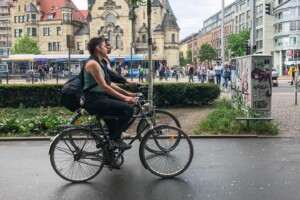Conference / Cycling
Mobycon at Velo-City 2023
From May 9–12, more than 1400 people from over 60 countries will attend Velo-City 2023 in Leipzig, Germany. This year, Lennart Nout, International Strategy Manager, Erik Ooms, Project Developer, and Babet Hendriks, Mobility Consultant, will speak at the conference and Dagmar Köhler, Strategic Consultant, will moderate two panel discussion sessions. We are excited to share our Dutch expertise in planning and design and hope to contribute to the latest innovations in cycling, active mobility and sustainable urban development. If you plan on attending, be sure to stop by Booth #39, our joint table with the German Institute of Urban Affairs (Difu), to say hi!


Working together to create a Global Capacity Building Programme on Active Mobility
Session #6.6: Global initiatives for more cycling
Presenter: Lennart Nout
Wednesday, May 10 @ 14:15 – 15:45 CEST
In this session, Lennart Nout, representing the Transport Decarbonization Alliance (TDA), will present a global capacity building initiative on walking and cycling. He will explain why we need a global capacity building programme, what it can deliver to cities around the world, and how people can register their interest in participating.
The TDA is a global collaboration between ambitious cities, countries and companies, working towards a net zero emission transportation sector in 2050. More walking and cycling is an integral part of this mission. As the TDA sees increasing levels of investment in active mobility, a lack of capacity in the workforce to deliver high quality active mobility facilities becomes apparent. To remedy this, a Call to Action has been launched at the COP27 conference in Egypt. This initiative aims to have two key results. The first is an annual investment of $10M to train 10.000 transportation professionals over ten years in global best practice in walking and cycling. This will enable a sustained local body of knowledge on the topic and improve the outcome of investments. Secondly, the initiative will link global financial institutions that are looking for greener transport investments to ambitious cities and governments looking for investors for a sustainable transport project, thus filling a pipeline of active mobility investments on a global scale. The call to action has been widely supported and The Dutch Ministry for Transport helped to bring this capacity building closer to being a reality and is actively investing in the first pilot trainings.

“Computer says no” — Data fetishism blocking a cycling transformation
Session 10.3: Not an end in itself: Technologies that impact cycling
Presenter: Erik Ooms
Friday, May 12 @ 9:00 – 10:00 CEST
In Germany there exists a strong technocratic and model-oriented approach. Data is seen as the holy grail for decision-making, and technology as progress and determining the future. I had entered the world of data fetishism and, “Computer says no.”
Data has its place, however, in Germany, and other countries, data and models focus on growth trends and not on reductions, rarely including a system perspective, like the relationship between mobility and urban sprawl. Many of the most relevant trends and barriers cannot be easily measured and therefore are left out, especially relating to behaviour, essential in cycling policy. Policymakers view data analysis reports with a high level of certainty, or misinterpret the findings, and the technical discourse used in data and models (incl. methods) limits understanding and opportunities for discussion with citizens or other sectors. Data and models show the current and possible future trends, while simultaneously blocking radical normative alternatives, and data gathering and studies tend to contribute to slowing down transformation by missing windows of opportunities –another feasibility study anyone? Finally, and importantly, models are not inclusive enough to account for different societal groups.

Enhancing equitable mobility policy: using the Mobility Doughnut frame in collaboration with local stakeholders
Session 11.2: Changing perspectives to build a vision
Presenter: Babet Hendriks
Friday, May 12 @ 10:15 – 11:15 CEST
For whom and why do we work on our mobility system? Many mobility or urban planners seem to think – often unconsciously –that tomorrow’s world should enable faster travelling and bridge larger distances. This is also how contemporary policy often functions: design for a better flow through arterial roads and dissolve bottle necks. This approach has reached, as we all know and experience, its boundaries. Therefore, we have introduced a new perspective to the mobility system: the Mobility Doughnut, which measures the impact of mobility on society and the environment, helping meet the needs of everyone, without reaching the limits of our planet.
At Mobycon we have developed a Mobility Doughnut methodology to help local stakeholders envision the future of their living environment. The Mobility Doughnut framework is at the heart of every session, going from problem analysis (the current Mobility Doughnut balance) to what kind of living environment do we aspire to live in (the intended Mobility Doughnut balance). This helps to come up with a set of measures that favor an equitable environment, prioritizing measures for active mobility measures and reallocation of space.
We want to encourage other colleagues to use and apply the Mobility Doughnut frame by showing how it works in a workshop setting.

Panel discussion
Session 4.1: Learning from each other: The state of the art in capacity building and knowledge transfer
Moderator: Dagmar Köhler
Wednesday, May 10 @ 10:45 – 11:45 CEST
A key ingredient to leverage the potential of cycling is professional capacity – from decision making to implementation. How do practitioners learn from each other to replicate best practices and avoid making the same mistakes? How do they access research findings, and how does new knowledge actually permeate into practice, design guides and decision making? How to best address politicians and decision makers, so they understand the role of cycling and take the decisions needed to deploy its potential? This session takes a look into the kitchen on the lookout for the recipes it takes to build the capacity we need.
Panel discussion
Session 8.4: Creating a shared mindset to deal with bikelash
Moderator: Dagmar Köhler
Thursday, May 11 @ 12:00 – 13:00 CEST
Along with the growing movement in support of cycling, a loud minority defending the car’s priviledges appears whenever cities implement bold measures. How can we deal with the fight about public space? Should we counter these voices or can we create a common understanding and get them on board the transition towards more liveable spaces? This session will take us through Canada, Georgia, Belgium, Brazil and Romania and make us reflect on how the different challenges can be tackled.
The Velo-city 2023 conference will be held in Leipzig, Germany from May 9–12. For more information about programming and registration, see their website: https://velo-city2023.com

